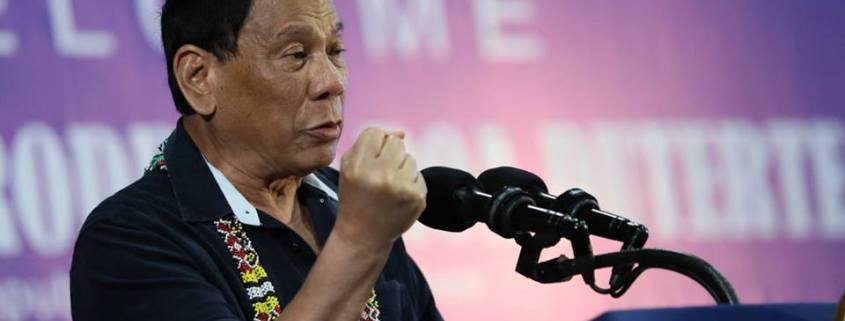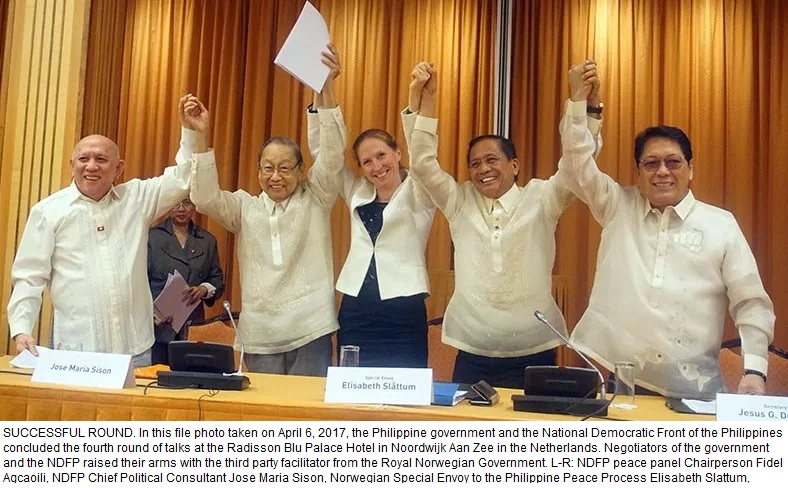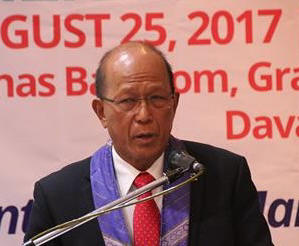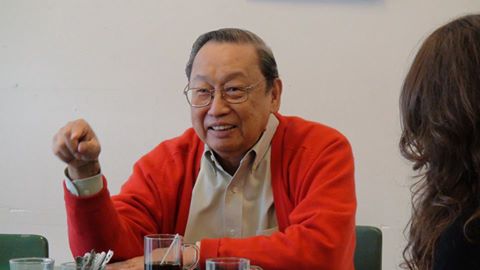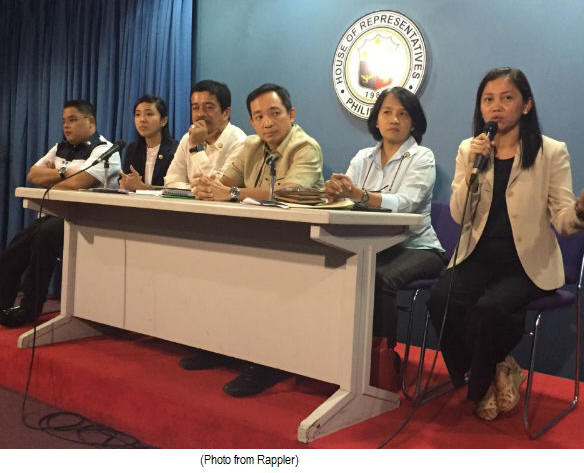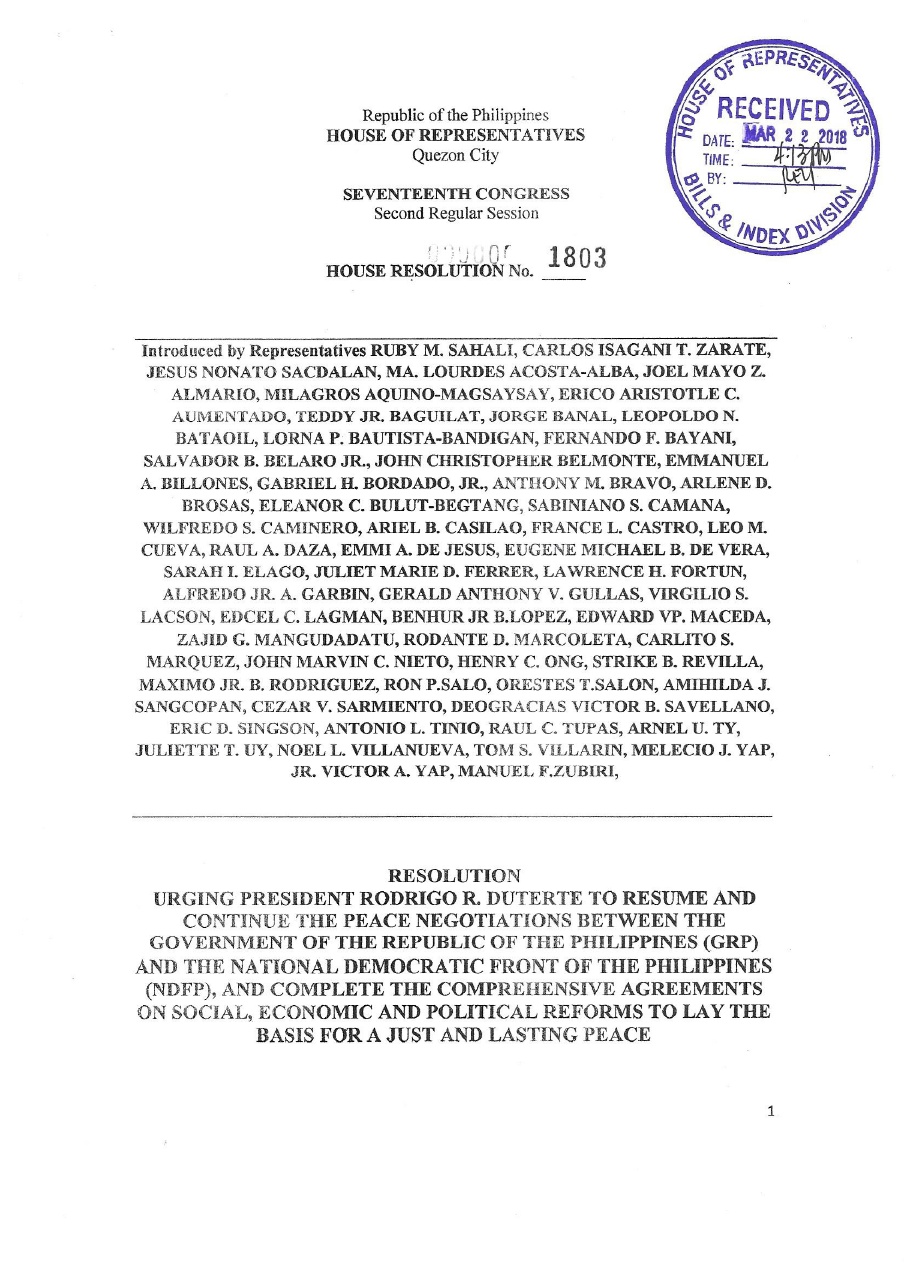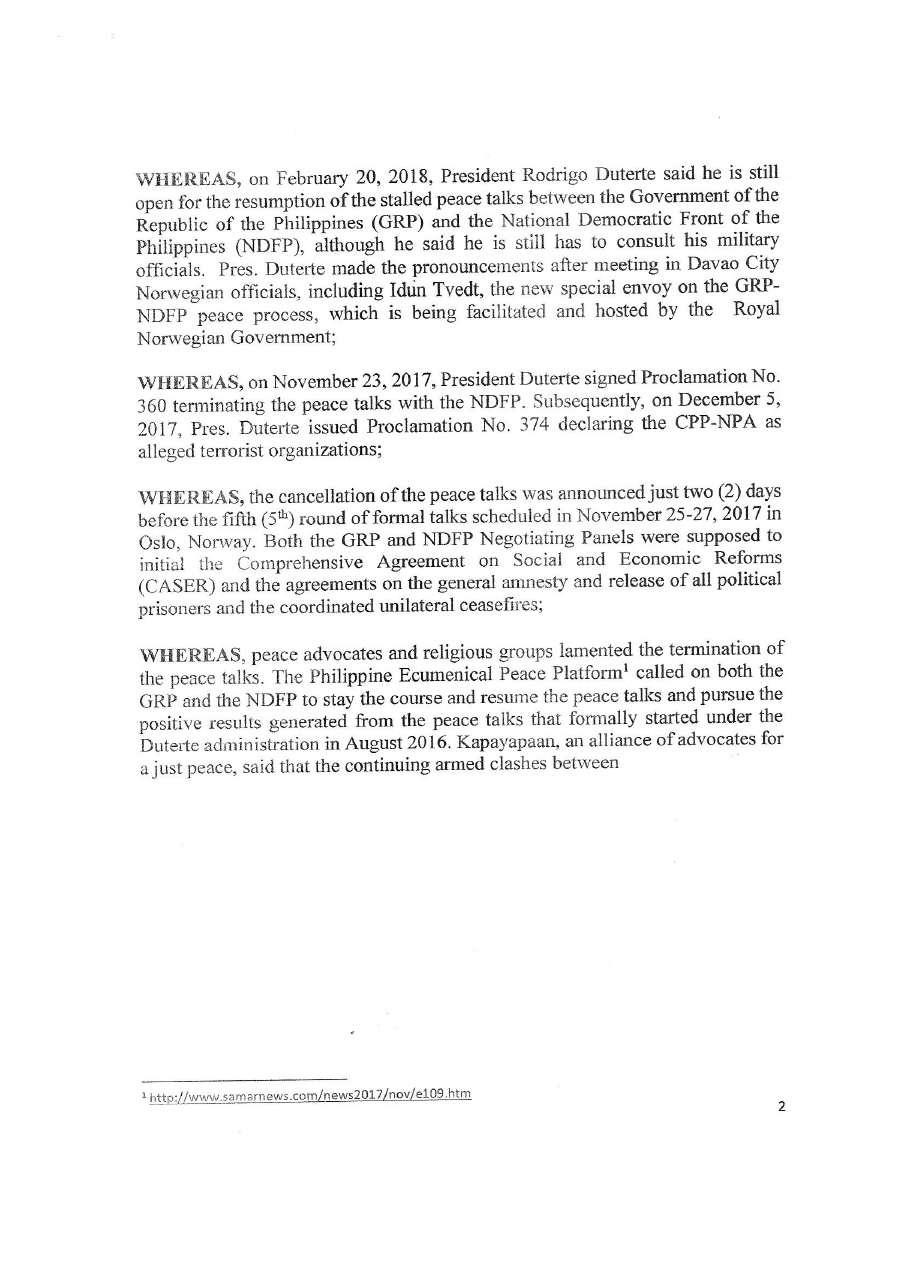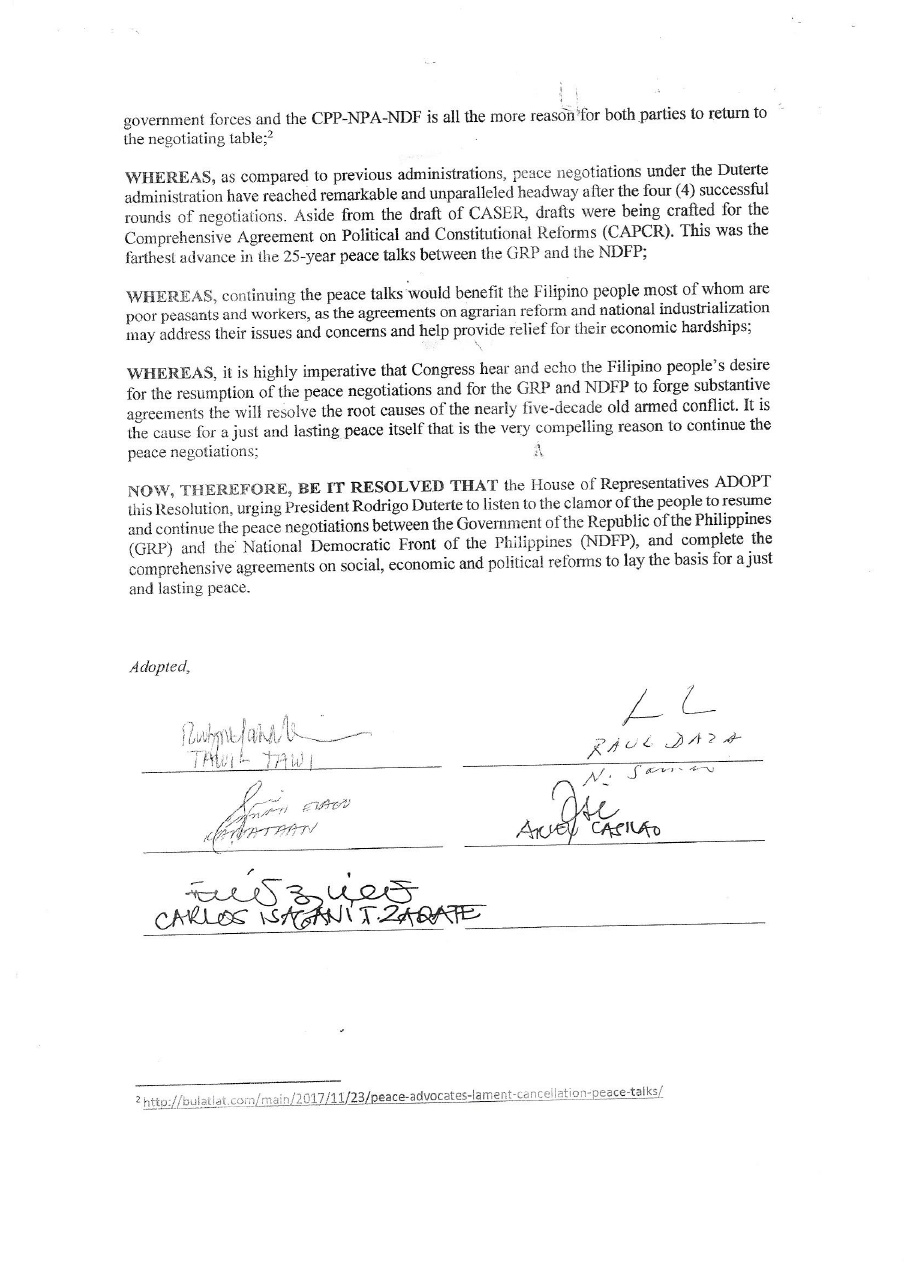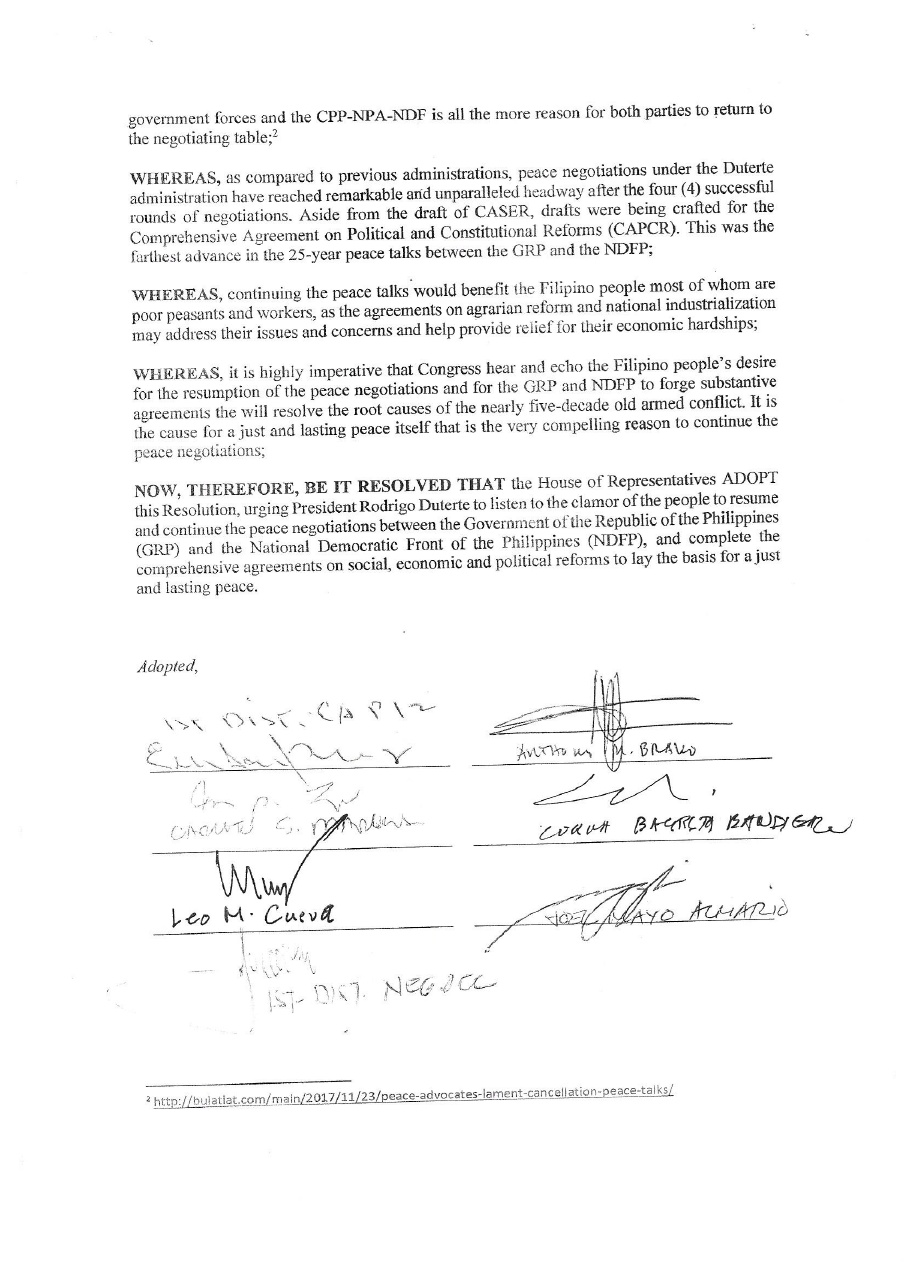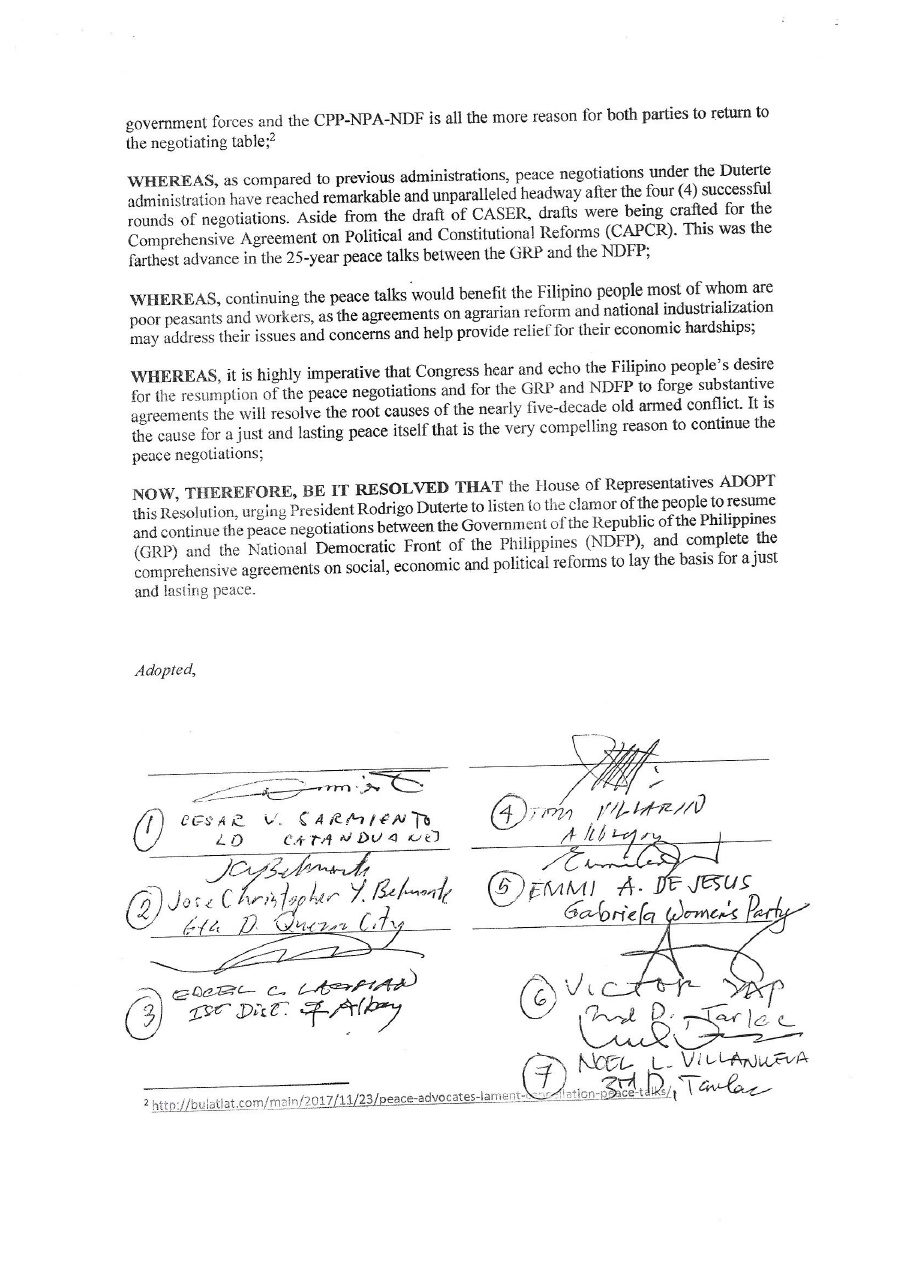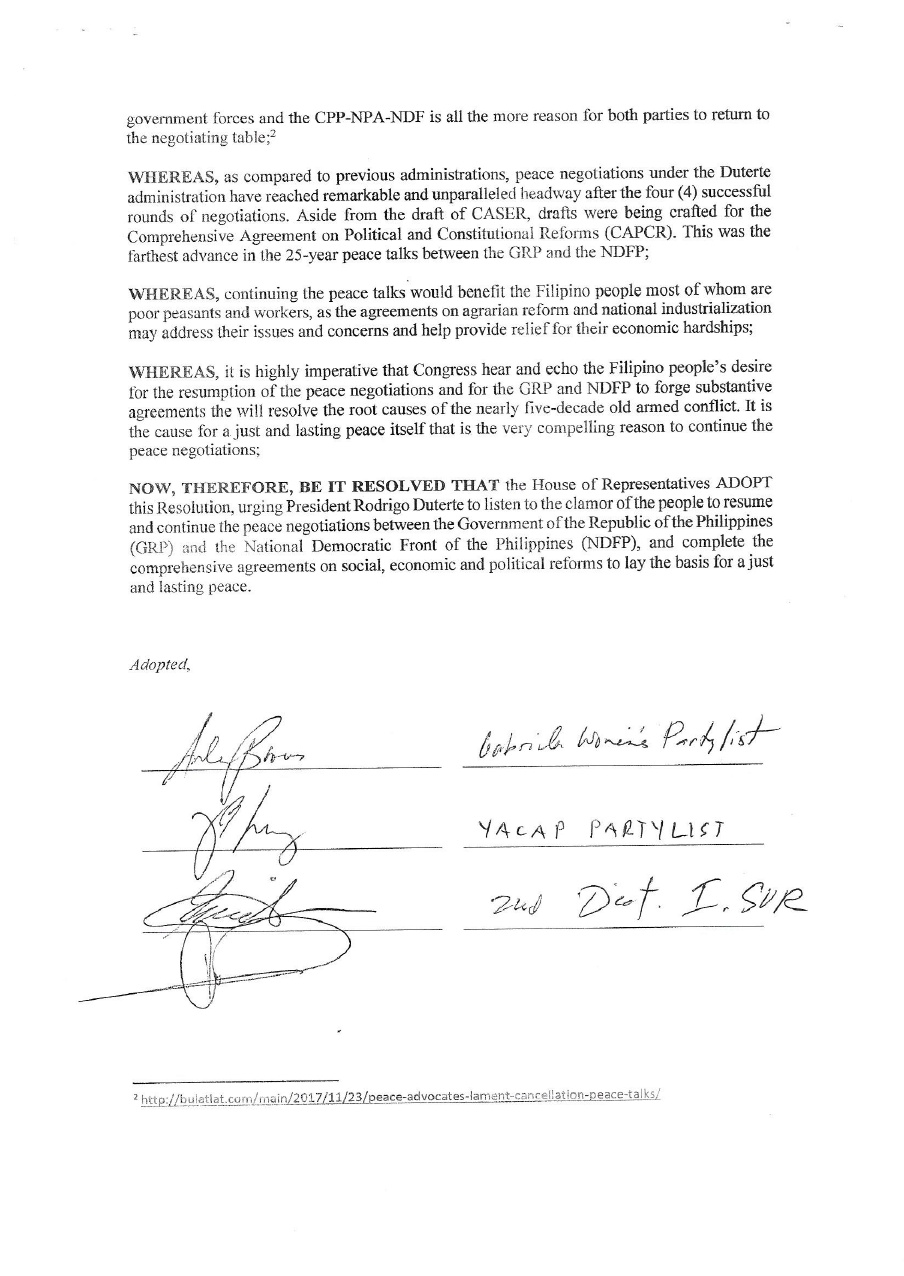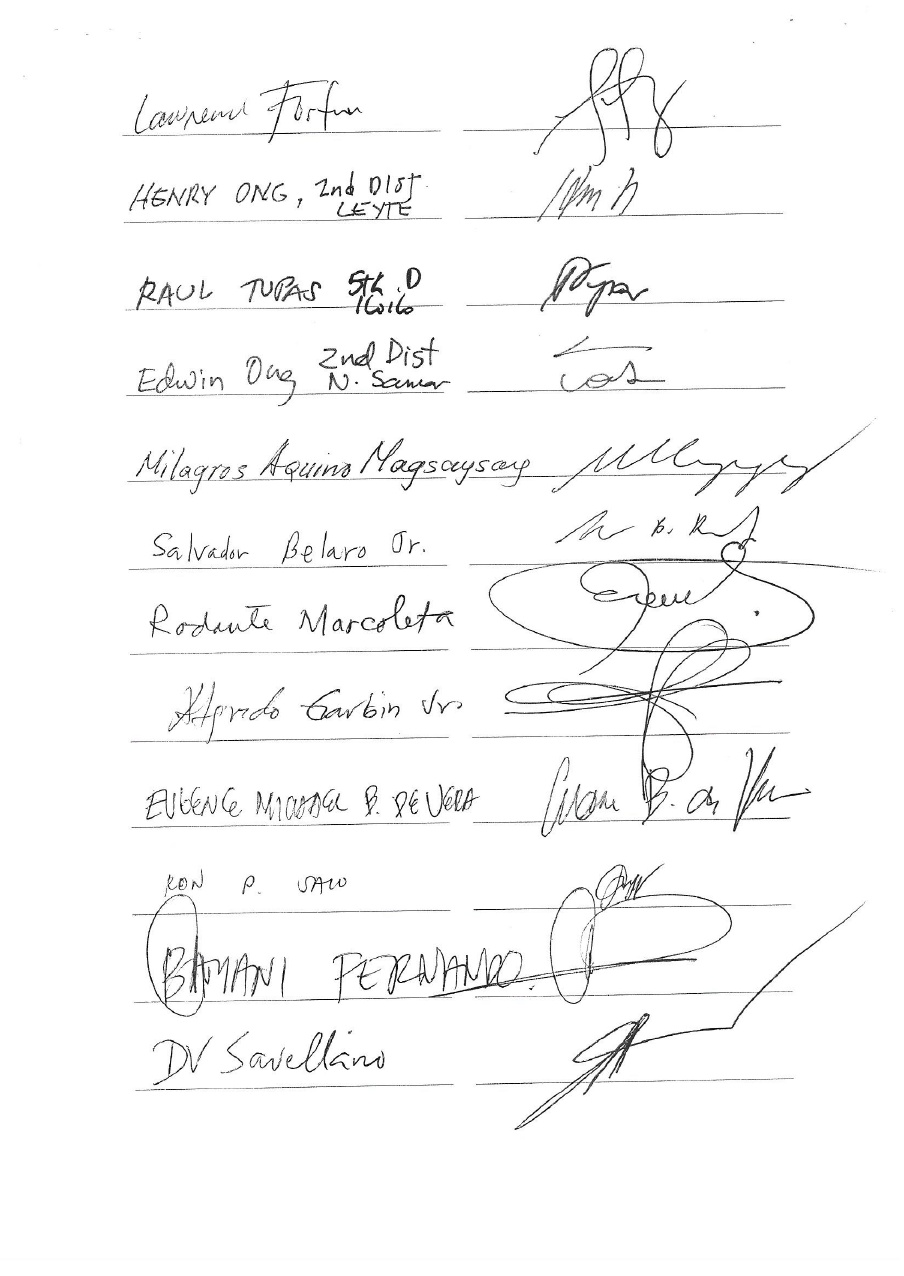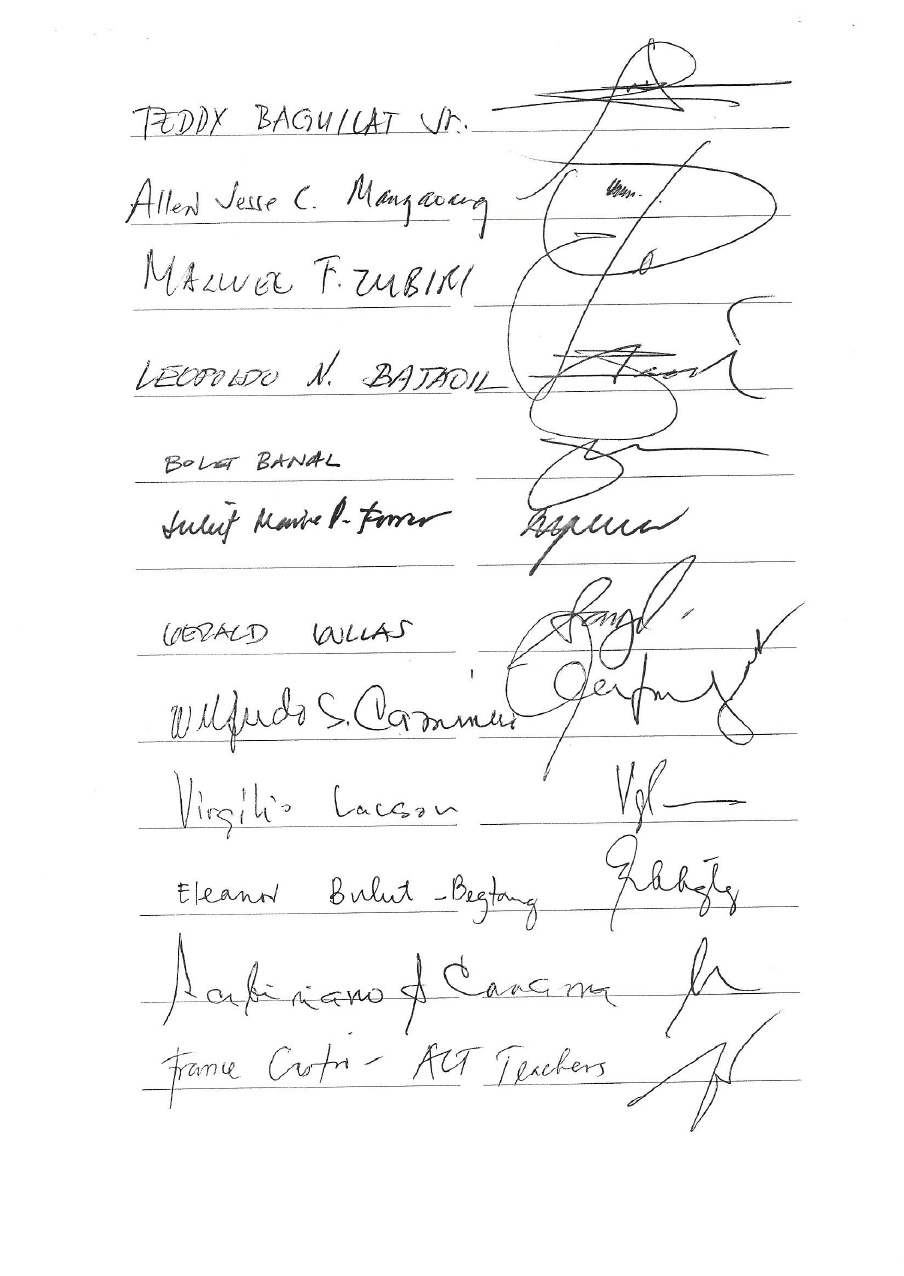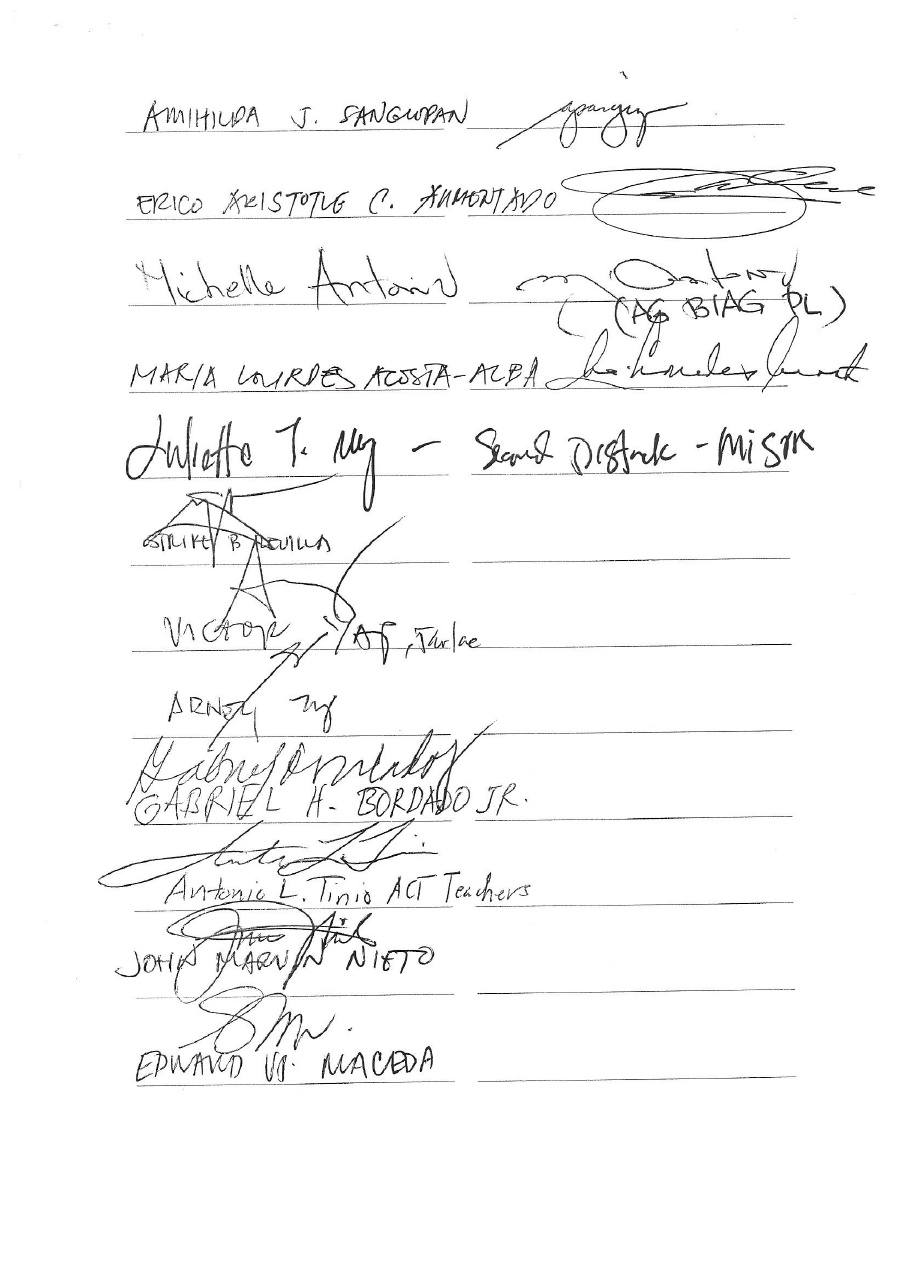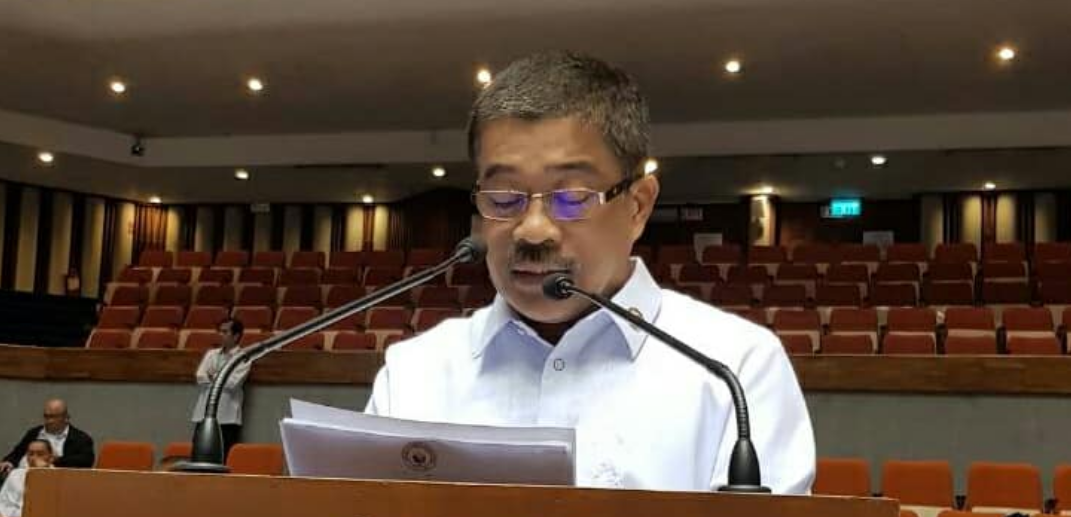
PRIVILEGE SPEECH ni Rep. Carlos Isagani T. Zarate
BAYAN MUNA PARTYLIST
Lunes, 12 Pebrero 2018
Ginoong Speaker:
Alam naman po nating lahat na sa ngayon ay nakatigil ang usapang pangkapayapaan sa pagitan ng Government of the Republic of the Philippines (GRP) at ng National Democratic Front of the Philippines (NDFP). Nakakalungkot po dahil ang nakasalang na sa huling usapan ay ang pagkakasundo ng dalawang panig sa pinaka-kritikal na bahagi ng usapang pangkapayapaan na tinatawag na Comprehensive Agreement on Social and Economic Reforms o CASER.
Sa higit dalawang dekadang kasaysayan ng usapang pangkapayapaan sa pagitan ng GRP at NDFP, ngayon lamang mapag-uusapan ang mga pang-ekonomiyang batayan ng paghihirap ng mamamayan. ‘Ika nga, malapit sa bituka ng mamamayan. Itinuturing ang CASER bilang pinakamahalaga, at pinaka-kritikal, na bahagi ng usapang pangkapayapaan dahil isasalang at sisikaping pagtibayin sa pagkakataong ito ang isang komprehensibong balangkas para tugunan ang ugat ng papalubhang kahirapan sa bansa, na siyang dahilan ng armadong tunggalian.
Nilalaman ng CASER ang isang sosyo-ekonomikong alternatibo upang tuluyang mawaksi ang matagal ng mga polisiyang nagpapahirap sa ating bansa at mamamayan, mga polisiyang “neoliberal.”.
Ngunit, Ginoong Speaker, ano nga ba itong sinasabi nilang “neoliberalismo”, na sa tanang kasaysayan ng bansa ay tinututulan ng mamamayan?
Ang neoliberalismo ay kaisipang tanging nakasentro at nakasalalay ang takbo ng ekonomiya sa isang malayang merkado. Ang merkadong ito, o free market, ang siya ngayong magdidikta sa kaayusan at tatakbuhin ng isang lipunan. Ang tanging gampanin ng Gobyerno ay huwag makialam at bagkus, gawin pa nga ang lahat para hayaang malaya ang takbo nito.
Sa sistemang ito, itinuring ang tao ay isa lamang produkto at ang lipunan, isang malaking merkado.
Ngunit sa dekadang karanasan partikular ng mga kapitalistang bansa, ang sinasabi pala nilang merkado ay isang malaking palaruan ng mga monopolyo, kartel at oligarkiya. Sila lamang po ang malayang nagpapasahan sa yaman ng daigdig.
Ibinandera ng neoliberalismo bilang patakaran ang globalisasyon sa pamamagitan ng pagliliberalisa sa kalakalan upang mas maluwag na makapasok ang dayuhang pamumuhunan at kapital.
Nagluwal ito ng walang habas na pribatisasyon ng mga batayang serbisyong panlipunan kagaya ng kalusugan, edukasyon, pabahay at irigasyon, gayundin ng mga public utilities kagaya ng kuryente,tubig, langis at transportasyon at iba pang impresa ng Gobyerno. Ipinatupad rin ang deregulasyon o pagluwag ng mga patakaran para lalong makapagkamal ng tubo ang mga pribadong korporasyon at kapitalista.
Sa papaanong paraan pa lalong naitaguyod ang sistemang neoliberal? Nitong nagdaang mga taon, nilumpo nito ang mga unyon; tagapagtaguyod ito ng mababang pasahod sa mga manggagawa para pang-akit ng mas marami pang dayuhang mamumuhunan; nagbunsod ito ng regresibong sistema ng pag buwis kung saan higit ang binabayad ng mahihirap, samantalang nakakalibre pa nga ang mayayaman. Neoliberalismo rin ang nasa likod ng walang habas na land conversions sa kalunsuran at kanayunan.
Ngunit anong idinulot nito? Nanatiling bansot, atrasado at ampaw ang ekonomiya ng bansa. Opo, ekonomiya nating tinatawag ang walang hanggang pag-export ng hilaw na materyales at murang paggawa.
Unti-unting nalusaw ang mga papasibol pa lamang na mga lokal na industriya at impresa. Kaya naman taun-taon, signipikante ang pagbagsak ng produksyon sa agrikultura at manupaktura.
Patuloy namang nauubos ang ating likas na yaman nang wala man lang tayong halos napapakinabangan. Katunayan, nitong 2016 nagtala lamang ang pamahalaan ng P2 Bilyong kita sa industriya ng pagmimina, pinakamababa magmula noon 2011, samantalang bilyong dolyares na halaga ng mga mineral ang hinahakot o ipinupuslit ng mga malalaking dayuhan at local na mining corporations palabas ng bansa.
Sa kasalukuyan, 8 sa 10 mga magsasaka ang hindi nababahaginan ng lupang kanilang sinasaka, habang, napakalawak ng mga lupain ang muling narekonsentra sa mga panginoong maylupa, kabilang ang mga land developers, dahil sa hungkag na rerpomang agraryo.
Atrasado pa rin ang ating ekonomiya. Nanatiling lantay at laganap ang kahirapan, gutom at kawalan ng trabaho. Lumaganap ang kontraktuwalisasyon.
Lalong lumawak ang agwat ng mayayaman sa mahihirap sa bansa. Ayon sa Ibon Foundation, sa loob ng taong 2010-2015, lalong lumayo ang agwat ng income growth sa pagitan ng mga manggagawa at tubo ng sampung pinakamayayamang pamilya sa bansa.
Mula P346.00 noong 2010 hanggang P 363.00 noong 2015, disi-syete pesos (P17.00) lamang na pagtaas ng real minimum wage ang natamo ng mga manggagawa sa NCR.
Samantala, mula P630 Bilyon na pinagsamang kita ng sampung pinakamayayamang pamilya noong 2010, naging lampas triple ito pagdating ng 2015, kung saan umabot ng P2.2 Trilyon ang kabuuang tubo ng mga nasabing pamilya.
Ang yaman naman po ng 25 pinakamayamang pamilya ay katumbas na ng kabuuang kita ng 76 milyong Pilipino sa isang taon. Madaya, hindi malaya, ang merkado, Ginoong Speaker.
Wala ni kaunting patak o ambon man lang ang sinasabing trickle-down economy: nanatiling 25 porsyento ng populasyon ang naghihirap, halos kapareho ng antas noong 2003 at lalala pa ito dahil sa TRAIN law na nagsimula ng magpataas pa ng presyo ng mga bilihin.
Kung walang pakialam ang patakarang neoliberalismo sa tao, mas lalo pa sa karapatan ng mga ito. Hindi naman sinusukat sa ating GDP kung ilang katutubo ang mapatay at mapaalis sa kanilang mga lupaing minana, kung ilang komunidad ang nasa ligalig pagdating ng mga sakuna, kung ilang aktibista at masa ang dinarahas dahil sa kanilang pag-aasam ng pagbabago.
Sa madaling salita, ang tanging nagawa ng neoliberalismo ay mas lubusang ikonsentra ang yaman ng mundo sa iilan. Kaya naman kahit ganoon na kalaganap ang kapalpakan ng neoliberalismo, mulat at patuloy na sinasamba ang bangungot na ito ng dayuhang dambuhalang kapitalista at mga kasabwat nilang mga Pilipinong negosyante, panginoong maylupa at mga taga-Gobyerno. Dahil sila lang ang nakikinabang.
Sa kabilang banda, Ginoong Speaker, naramdaman at patuloy na mararamdaman din ng buong mundo ang krisis ng neoliberalismo. Saan pa nga ba unang naramdaman ang krisis nito kundi sa mismong tinuring na tagapamandila ng neoliberal na kaisipan, ang imperyalistang Estados Unidos.
Matatandaang noong 2008 nagpalitaw ng $17 Trilyones dolyares para lang i-bail out o salbahin ang mga ganid na speculators ng Wall Street at iba pang multilateral na institusyon na siya rin namang dahilan ng financial meltdown.
Ano po ang halaga ng $17 trilyon? Sapat na po ito para pawiin ang gutom sa mundo sa loob ng 600 taon.
At, ano ang nangyari at kapakinabangan nito sa kinalaunan? Magpasa-hanggang ngayon ay hindi pa rin nakabangon sa pagkalugmok ang pandaigdigang merkado at pinansya. Halos walang nakasuhan sa mga may pakana ng financial crisis noong 2008. May 65-70 porsyento ng mga mamamayan sa top 25 high-economy countries ang nakaranas ng pagbaba ng kanilang real income.
Umabot ang sakit maski sa politikal na hibla ng bawat kapitalistang bansa, at umusbong ang ilang signipikanteng tugon ng mga mamamayan nito laban sa sistemang ito. Mga patunay dito ang kamakailan lang na pagbaklas ng Britanya sa European Union at ang pagkaluklok ni Donald Trump bilang presidente ng Estados Unidos. Naudlot ang pag-arangkada ng Trans-Pacific Partnership — na balak sanang pasukin ng nakaraang administrayson –salamat sa mga pagkilos at pagtutol ng mga mamamayan sa bansa at sa buong daigdig.
Neoliberalismo rin po ang dahilan sa paglipana ng iligal na droga. Dahil sa kawalan ng trabaho, mataas na presyo ng mga bilihin at kawalan ng access sa mga batayang serbisyong panlipunan, napipilitang kumapit ang ilan sa ating mga kababayan para pumasok sa iligal na industriya ng droga. Samantala, nagagamit ito ng Estados Unidos, particular sa kanilang inilulunsad na war on drugs sa Colombia at Mexico, upang palawigin at itayo ang kanilang neoliberal na interes sa mga nasabing bansa.
Ginoong Speaker, trahedyang maituturing ng lipunan nating ito na bunga ng pagkakapako natin sa sistemang neoliberal, hanggang sa ngayon, ultimo pagawaan ng pako ay wala tayo.
Daang Matuwid ang tinawag rito ng administrasyong Noynoy Aquino, Ginoong Speaker. Isang programang kinamuhian ng mamamayan at ni Pangulong Rodrigo Duterte.
Kaya naman ganun na lamang ang pagkabahala at pag-alma ng mamamayan ng ipahayag ni Pangulong Duterte na ipagpapatuloy nito ang economic agenda ng administrasyong Aquino, kahit na noon pa man ay malinaw na sa kanya ang epekto ng neoliberalismo sa ating sambayanan.
Sa katunayan, sa victory speech ni Pangulong Duterte noong Hunyo 2, 2016 idiniin niyang isa sa mga ugat ng ating sosyo-ekonomikong problema ay ang “onslaught of the World Trade Organization”. Tinukoy niya ring pangunahing problema ang kawalan ng seguridad sa trabaho, konserbatibong piskal na patakaran ng pamahalaan at ang kalunus-lunos na kalagayan ng industriya ng pagmimina sa bansa.
Ngunit para bagang nag-iba ang ihip ng hangin. Ipinangalandakan ngayon na ipagpapatuloy, at, ngayon nga ay gumugulong ang panukalang pag-amyenda ng Konstitusyon, upang paluwagin lalo ang matagal naman nang pinaluwag na dayuhang pagmamay-ari ng lupain sa bansa — kahit pa mayorya ng mamamayan (44% sa huling Pulse Asia sarbey) ang tutol rito.
Sa kabilang banda, nanatili pa rin ang patakarang pribatisasyon at deregulasyon kahit pa may mga matingkad nang manipestasyon ang pagpalya nito.
Halimbawa, isa na ang Pilipinas sa may mga pinakamataas na presyo ng kuryente sa daigdig dahil sa pribatisasysyon ng power sector na iniluwal ng EPIRA. Bukod pa rito, napatunayan natin nitong nakaraang mga pagdinig sa pambansang badyet na kahit mai-privatize na lahat ng natitirang power assets ng gobyerno, may matitira pa ring bilyun-bilyong utang na ipapasa rin lang sa mga konsyumer.
Ngayon, inaprubahan ng economic cluster ng Gabinete ang posibleng pagsimot ng Malampaya funds para lang bayaran ang residual liabilities ng PSALM na nagkakahalaga ng PHP245bilyon. At mukhang mauuwi rin lang sa wala ang planong ito na gamitin ang pondo ng Malampaya para bumaba ang presyo ng kuryente dahil nakaambang magtaas ng presyo ng kuryente pagdating ng Marso ngayong taon dahil na naman sa Malampaya shutdown. Kaparehong sitwasyon po ito noong 2013 na anomalya sa Malampaya.
Wala na daw poder ang pamahalaan sa pagpapatakbo ng ekonomiya, pero, heto ngayon, obligadong saluhin nito ang kapalpakan ng sistemang hinayaan nitong lumaganap. Kaliwa’t kanang arbitration cases ang hinaharap ng pamahalaan ngayon mula sa iba’t ibang pribadong kontraktor. Nandyan ang P125 Bilyong income tax na ayaw bayaran ng kontraktor ng Malampaya, ang Shell Philippines. Andiyan din ang di makatarungang paniningil sa kasalukuyan ng Manila Water at Maynilad ng humigit-kumulang P82 bilyon na diumano’y losses nila mula sa desisyon ng MWSS na ipagbawal na ipasa ng dalawang kumpanya ang kanilang income tax sa mga konsyumer.
Sa kaso ng pribatisasyon ng LRT 1, dahil sa kapalpakan ng Gobyernong maisagawa ang kanilang mga obligasyon sa kontrata, sila pa ngayon ang obligadong magbayad ng ‘penalties’ sa private contractor na LRMC. At saan po kukuhain ang pambayad? Doon po sa kakapiranggot na 9 na bilyong pisong premium na ibinayad ng LRMC sa Gobyerno. Sa esensya, ibabalik lang po sa LRMC kung ano ang ibinayad nila.
Ipinapakita ng mga tinaguriang “economic managers” ng gobyerno kung sino ang tunay nilang pinaglilingkuran. Samantalang kinontra nila ang maka-mahirap na dagdag pension sa SSS at moratorium sa kumbersyon ng agricultural na mga lupain, agresibo naman nilang itinulak ang TRAIN at ang pagdagdag sa premium ng SSS.
Sa kaso ng SSS, imbes na pakinggan ang panawagang magsagawa ng reporma bilang kaakibat ng dagdag pension, kagaya ng paghahabol sa delinquent employers at pagpapalawak ng investment, ipinipilit ng mga economic managers na ito ang itaas na lang ang contribution rate.
Sampal ito sa mga manggagawang kamakailan lamang ay pinagkaitan ng dagdag pasahod. Sabi ng NEDA at ng ECOP, humigit kumulang daw P166 bilyong piso kada taon ang kailangan para maipatupad ang wage hike. Pero, maatinanong din natin: magkano ba ang lost revenues kada taon ang gobyerno dahil sa collection inefficiency ng mga revenue generating agencies na kagaya ng BIR at BOC? Tumataginting po na P600 Bilyon noong 2012 o katumbas ng 4% ng GDP natin kada taon.
Kung gaano binabarat ng ating mga economic managers ang ating mga manggagawa, ganoon naman ang kanilang pagka-galante sa mga mayayaman at malalaking korporasyon. Sa kasalukuyang corporate income tax rate na 32%, palaki ng palaki ang corporate profit ng mga korporasyon ng 15.9 percent kada taon, ayon sa talaan ng banking HSBC.
Sa katunayan, noong 2016, tumabo ng higit P4 Trilyon ang pinagsamang net worth ng singkwentang pinakamayayamang pamilya sa bansa—higit pa sa ating pambansang badyet ngayong taon. Pero mukhang hindi pa ito sapat dahil gusto pa ng mga “economic managers” na babaan pa ang corporate income tax rate ng mga ito sailalim ng tax reform package 2 at ipasa na lamang sa mga ordinaryong mamamayan ang pagpasan sa problema ng ating bansot na ekonomiya. Hindi lang yan, gaano po kalaki ang tax at fiscal incentives na inaasahang ibigay ng Gobyerno sa mga kumpanyang ito? P180 bilyon kada taon.
Sa kabilang banda, hindi pa rin natutupad ang pangakong tuluyang wakasan na ang anumang porma ng kontraktwalisasyon, na siyang salot sa right to security of tenure ng ating mga manggagawa. Ang panukalang batas na pumasa sa Kongreso ay isang pekeng anti-ENDO bill at ni ayaw pa ngang tanggalin ni Pang. Duterte ang lahat ng ENDO maski nakipagdadayalogo na sa kanya ang mga union ng mga manggagawa kamakailan. Patuloy pa rin ang laban ng mga manggagawa para tuluyang i-abolis ang anti-manggagawang patakarang ito.
Ginoong Speaker, mga kasamahan ko sa Kongreso, ganito na po kabulok ang sistemang neoliberal. Nananatili at nagpapatuloy pa rin ang neoliberal na kapit at impluwensya nito sa kasalukuyang pamahalaang kahit na malawak na ang disgusto at pagtutol ng ating mga mamamayan dito.
Hindi totoong walang alternatibo sa kasalukuyang sistema. Sa katunayan, ilang dekadang pakikibaka na ang ginugol ng sambayanan para makamit ang isang panibagong sistemang protektado at pinoprotektahan ng demokratikong interes ng mamamayan at ito ang nilalaman ng CASER.
Sa ilalim ng panukalang CASER nakapaloob ang mga sumusunod na repormang nais itaguyod ng sambayanang Pilipino:
Una, repormang agraryo at kaunlaran sa kanayunan na nakasalalay sa libreng pamamahagi ng lupa, kooperatibisasyon, mekanisasyon ng agrikultura at pagtaguyod ng mga industriyang rural;
Pangalawa, pambansang industriyalisasyon, na ang salalayan ay repormang agraryo, sa pamamagitan ng pagtatayo ng mga heavy industries at light industries bilang tulay.
Pangatlo, isang patakarang pagtaguyod ng kalikasan kung saan mahigpit na nililimitahan ang large-scale foreign and local mining at marine wealth extraction. Sisiguruhin ang oryentasyon ng industriya ng mina ay naka-ugnay sa pambansang industriyalisasyon
Pang-apat, isang kumprehensibong patakarang puprotekta sa sosyo-ekonomikong karapatan ng mga mamamayan, mga manggagawa, magsasaka, fisher folk, propesyunal, OFW, kababaihan at kabataan, atbp. Sa halip na sovereign guarantees ang tinitiyak, ginagarantiyahan sa ilalim ng CASER ang karapatan ng publiko sa libreng edukasyon, kalusugan, pabahay at iba pang serbisyong pampubliko.
Pang-lima, pagtaguyod sa isang makabayan, siyentipiko at pangmasang kultura.
Pang-anim, pagtaguyod sa karapatan ng ating pambansang minorya sa sariling pagpapasya, pag-unlad at laban sa diskriminasyon.
Panghuli, isang komprehensibong balangkas ng reporma sa kalakalan, pamumuhunan, pinansya at patakarang piskal na ang pangunahing layunin ay pagwaksi sa ating kolonyal na relasyon sa mga imperyalistang bansa. Kabilang rito ang pagtalikod sa mga patakarang neoliberal na idinidikta ng IMF, World Bank at WTO.
Noong isang taon ay nakatanggap ang administrasyong Duterte ng halos isang trilyong pisong Official Development Assistance mula sa China at Japan. Mariin ang ating posisyon na hindi dapat ito pagmulan ng kung anumang kondisyon para itali ang ating bansa sa interes ng mga bansang ito. Kaya naman aming hinihimok ang administrasyong ito na gamitin ang mga pondong ito para sa inisyal na pagsasakatuparan ng kahilingan ng mamamayan na magkaroon ng mga batayang industriya sa bansa.
Makatwiran at makatarungang mga reporma, Ginoong Speaker, mga kasamahan sa Kongreso, kaya mahalaga na muling buksan at ituloy ang usapang pangkapayapaan. Atin pong suportahan ang pambihirang pagkakataong maitakda ang isang mas demokratiko, maka-mamamayan at makabayang sosyo-ekonomikong struktura ng bansa.
Higit anupaman, may tungkulin tayong mga mambabatas na ipalaganap sa ating mga nasasakupan o constituents kung gaano kahalaga ang bahaging ito ng usapang pangkapayapaan — dito nakasalalay ang ating kinakabukasan bilang isang bansa.
ISULONG ANG MAKATARUNGAN AT PANGMATAGALANG KAPAYAPAAN!
ISULONG ANG PAGKAKAROON NG TUNAY NA REPORMANG AGRARYO AT PAMBANSANG INDSUTRIYALISASYON!
MULING ITULOY ANG NDFP-GRP PEACE TALKS!
Maraming salamat.
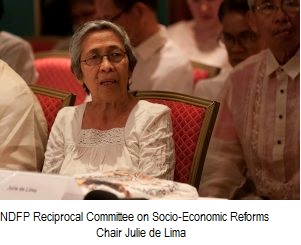 “The recent statement of Defense Secretary Delfin Lorenzana referring to the Comprehensive Agreement on Socio-Economic Reforms (CASER) as an example of the NPA’s insincerity show his utmost disregard for the Filipino people’s aspirations for economic development through national industrialization and land reform.”
“The recent statement of Defense Secretary Delfin Lorenzana referring to the Comprehensive Agreement on Socio-Economic Reforms (CASER) as an example of the NPA’s insincerity show his utmost disregard for the Filipino people’s aspirations for economic development through national industrialization and land reform.”
